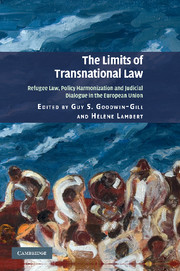 The Limits of Transnational Law
The Limits of Transnational Law Book contents
- Frontmatter
- Contents
- Notes on contributors and editors
- Acknowledgements
- Abbreviations
- 1 Transnational law, judges and refugees in the European Union
- 2 Where is the reference? On the limited role of transnational dialogue in Belgian refugee law
- 3 Transnational refugee law in the French courts: deliberate or compelled change in judicial attitudes?
- 4 The use of foreign asylum jurisprudence in the German administrative courts
- 5 The solipsistic legal monologue of Italian authorities
- 6 ‘Thou shalt not judge’ … Spanish judicial decision-making in asylum and the role of judges in interpreting the law
- 7 The British judiciary and the search for reciprocal relations with its continental partners
- 8 Speaking across borders: the limits and potential transnational dialogue on refugee law in Ireland
- 9 The absence of foreign law in Danish asylum decisions – quasi-judicial monologue with domestic policy focus?
- 10 Foreign law in Swedish judicial decision-making: playing a limited role in refugee law cases
- 11 The search for the one, true meaning …
- Bibliography
- Index
7 - The British judiciary and the search for reciprocal relations with its continental partners
Published online by Cambridge University Press: 06 July 2010
- Frontmatter
- Contents
- Notes on contributors and editors
- Acknowledgements
- Abbreviations
- 1 Transnational law, judges and refugees in the European Union
- 2 Where is the reference? On the limited role of transnational dialogue in Belgian refugee law
- 3 Transnational refugee law in the French courts: deliberate or compelled change in judicial attitudes?
- 4 The use of foreign asylum jurisprudence in the German administrative courts
- 5 The solipsistic legal monologue of Italian authorities
- 6 ‘Thou shalt not judge’ … Spanish judicial decision-making in asylum and the role of judges in interpreting the law
- 7 The British judiciary and the search for reciprocal relations with its continental partners
- 8 Speaking across borders: the limits and potential transnational dialogue on refugee law in Ireland
- 9 The absence of foreign law in Danish asylum decisions – quasi-judicial monologue with domestic policy focus?
- 10 Foreign law in Swedish judicial decision-making: playing a limited role in refugee law cases
- 11 The search for the one, true meaning …
- Bibliography
- Index
Summary
Introduction
The underlying theme of this volume is that of a transnational dialogue between refugee law judges in the European Union (EU). Most academics and practitioners agree that the dialogue of judges has become an important reality in the area of public law, but in the United Kingdom (UK) it is a rather new phenomenon. Until the Practice statement of the House of Lords of 1966, ‘dialogue with (living) academics’ was forbidden. A first step in that direction can be traced back to the mid 1970s, when leading British judges began to publish academic papers. The significant point here is that many of these papers offered comparisons with other jurisdictions. This trend gained real momentum during the 1990s, when Lord Goff of Chieveley (the then Senior Law Lord) made quite extensive use of continental materials, and started holding regular meetings between senior judges from different European countries with the aim of discussing developments in the law. Lord Goff's commitment to the use of comparative law in his judicial work was supported by many other leading judges, such as Lord Cooke of Thorndon, Lord Woolf and Lord Bingham. The latter in particular saw the use of case law from other European countries, ‘whatever their legal tradition’, not so much as ‘establishing a new tradition but reverting to an old and preferable one’. So, many leading British judges recognize the benefits of using foreign law (from both common and civil law traditions) in the area of public law.
- Type
- Chapter
- Information
- The Limits of Transnational LawRefugee Law, Policy Harmonization and Judicial Dialogue in the European Union, pp. 125 - 149Publisher: Cambridge University PressPrint publication year: 2010
